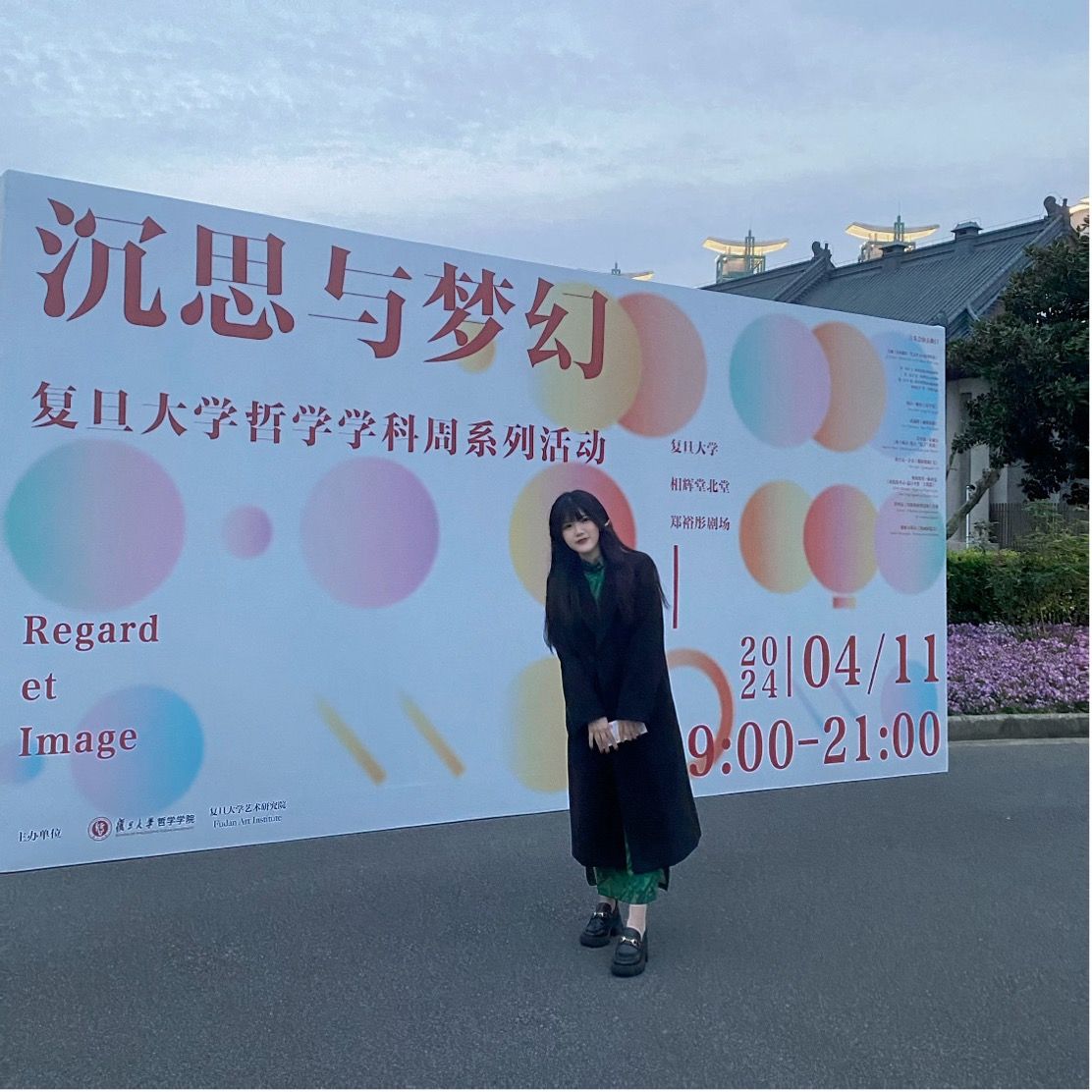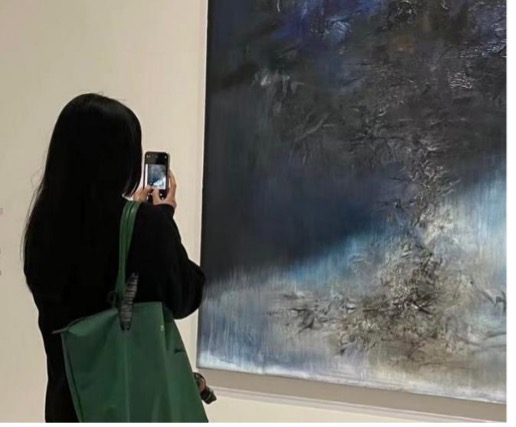Jin Shuzheng, a 2023 graduate of the Liberal Arts College at Chongqing University, wears many hats. She was formerly an international student from Korea majoring in philosophy, and now she is a master’s student in the Department of Philosophy of Art at Fudan University. Additionally, she was one of the main contributors to the Liberal Arts College’s Erya Studio. If one of the defining qualities of a liberal arts education is its enduring influence on life, then it’s time to shift the focus to graduates from the Liberal Arts College and listen to their stories.

“Everything at Fudan and in Shanghai is so different.”
This interview took place one month after her semester began. When I called, Jin had just finished some student work and started the conversation with, “Everything feels so different.” She explained that her current studies mainly focus on modern art theory and criticism, art history, and exhibition theory. In this unfamiliar environment, she’s still adapting. “Since I didn’t study art philosophy systematically during my undergraduate years, I find the initial learning phase a bit challenging. The department of philosophy of art at Fudan is newly established, and the professors have high expectations, so I haven’t fully adjusted to the academic pace yet. But the professors are very patient, and although there’s a lot of reading, I’m adapting well with my advisor’s guidance.”
Growth often comes with pressure and tension, yet Jin is actively embracing all the new possibilities in her environment. “During my undergrad, I was part of a team led by Professor Tang Jie to establish Erya Studio with my peers in the Liberal Arts College. The design group at Erya was always bursting with creative energy and exchanges of ideas. We grew together in a lively atmosphere, applying humanistic concepts to design practice, and I made my closest friends there. This experience gave me the courage and enthusiasm to participate in various student activities at Fudan. I joined the Graduate Student Union, the Cat Association, and other groups. My days are busy with studies and work, but they’re very fulfilling, and I’ve made a lot of new friends.”
When I asked her what stood out most, she said, “Beyond academics, the biggest difference is the rich artistic atmosphere and openness in Shanghai. With our professors, we’ve visited artist studios and attended small-scale salons and discussions. My classmates are from all over the world, and we often go to art exhibitions together. This level of frequent and concentrated art appreciation is something I didn’t experience during my undergraduate years, and it’s given me a sense of freshness and much more to think about, particularly on topics like human existence as portrayed through art.”

“The reflections on life and humanity hidden within art have a way of comforting my soul.”
Why did she choose art philosophy as her field of study for her master’s? Jin Shuzheng explained, “Before entering the Liberal Arts College, I already had a background in visual communication design, which sparked my curiosity during my everyday appreciation of art. I came across Nietzsche’s poetry by chance: ‘He who will one day thunder across the world must first silently endure deep solitude. He who would ignite lightning must wander like a drifting cloud.’ This struck me profoundly, awakening in me a sense of awe at life. It was this experience that led me to the Liberal Arts College to study philosophy and compelled me to think about the existence of beings and why they exist.”
The courses offered by the Liberal Arts College also played a key role in her decision to pursue this field. “In Professor Zhang Wentao’s intensive reading class on Odyssey, we explored the underlying reflections on life and humanity in literary works—questions that had always intrigued me. Discussing these themes not only opened my perspective on art but also comforted my soul. I later engaged in multiple discussions with my professors about Nietzsche’s critiques of Christianity. Through these conversations, I began to clarify my own areas of interest. During my third year, I stumbled upon Professor Shen Yubing’s introduction to the department of philosophy of art, which sparked my interest in the rational exploration of art. From that point on, I began to sense that art was more than a high-priced commodity—it could heal the soul and express societal thought. In my final year, I encountered Nietzsche’s ideas on tragedy, which, when viewed through the historical lens of Germany at that time, demonstrated how closely art, philosophy, and even political issues were intertwined. The combination of my personal interests, Liberal Arts College courses, and my professors’ guidance gradually led me to choose art philosophy as my master’s focus.”
“In countless moments, I’ve felt the light of the Liberal Arts College illuminating me, clearing the fog in front of me.”
“What are the specific differences in your studies as a graduate student?” I asked as we continued discussing her learning journey. She replied, “The major difference at the master’s level is the need to specialize in a single direction. At the Liberal Arts College, we studied a blend of literature, history, and philosophy. Now, diving into more segmented fields requires additional independent study, followed by analyzing various schools of art and the works displayed in art exhibitions.”
Although adjusting to this focused approach has been challenging in the short term, she says, “In conversations with professors and peers, I’m able to apply the broad knowledge I gained from the Liberal Arts College to approach problems from multiple perspectives. Thanks to this foundational education and my studies in classical subjects, I’ve been able to discuss Plato’s perspectives on art with my professors. In my art philosophy department, starting with the art history of ancient Greece feels like a homecoming—it’s reminiscent of those moments spent in the cozy courtyards of the Liberal Arts College, discussing ideas with teachers and classmates. This connection moves me deeply.”
“I was fortunate to discover my interest in Nietzsche’s philosophy of art and medieval philosophy during my four years at the Liberal Arts College, but in narrowing down my specific research points, I’ve sometimes encountered setbacks due to my intense personal interests. Yet, I persist in following my chosen path, for the warmth of the ideas I’ve found is like a flame I’m unwilling to leave behind.”

“Stick to Your Choice with Passion, and New Stories Will Unfold.”
“One feature of graduate studies is that no one pushes you forward; it’s all about intrinsic motivation,” Shuzheng said with a smile. When asked about her future study plans, she shared, “I spoke with my graduate advisor and expressed my intent to focus my research on Nietzsche, and my professor was very supportive. During freshman orientation, Professor Lin Hui at Fudan said something that resonated deeply with me: ‘The authority of philosophy is a false notion; its power lies not in authority but in the courage to pursue truth.’ I’d like to pass on that thought to my younger classmates at the Liberal Arts College. I also encourage them to keep a sense of curiosity and passion for the unknown—only then will new stories unfold. I hope they cherish their time at the Liberal Arts College, as graduate life feels less connected. I often miss the days at Liberal Arts College, where we had easy-going discussions, traveled together, and studied and worked side by side.” She added, “Physical and mental health are both essential. Fudan’s Philosophy Department has started a marathon event, and I hope the teachers and students at the Liberal Arts College stay active and maintain a passion for life.”
Growth isn’t just a matter of age or physical change. Shuzheng’s journey may be a reflection of growth we each experience in our way. As students at the Liberal Arts College, guided by the wisdom of past and present sages, we grow freely, finding our path through life’s joys and challenges. Wishing Shuzheng a brilliant journey ahead and wishing every member of the Liberal Arts College continued success on their own path.






